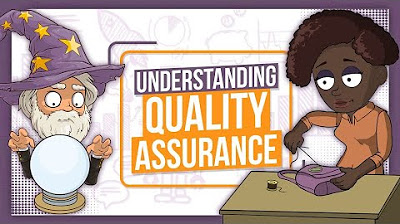QA/QC
Summary
TLDRThe transcript provides a detailed comparison of Quality Assurance (QA) and Quality Control (QC) in radiology, emphasizing their distinct roles. QA focuses on ensuring accurate diagnoses and patient safety through continuous improvement, while QC pertains to equipment performance and maintenance, including testing protocols required by regulatory bodies. Key topics include various testing methods, tolerances, and the importance of proper equipment functioning. The session aims to enhance understanding for board review, highlighting critical elements such as filtration, collimation, kVp accuracy, and the roles of technologists and service personnel in maintaining high standards of radiological practice.
Takeaways
- 😀 Quality Assurance (QA) focuses on improving processes in radiology, including customer service and diagnosis accuracy.
- 😀 Quality Control (QC) pertains to the maintenance and testing of radiology equipment to ensure optimal performance.
- 😀 QA aims for accurate and timely diagnoses while minimizing patient radiation exposure.
- 😀 QC programs are essential and mandated by the Joint Commission (TJC).
- 😀 Key QC tests include acceptance tests, routine maintenance, and error maintenance.
- 😀 Filtration is critical for beam quality; it must be tested annually to ensure it meets standards.
- 😀 Collimation light field alignment should be accurate within 2% of the Source-to-Image Distance (SID).
- 😀 The effective focal spot size must be within 50% of the equipment specifications.
- 😀 KVP accuracy is crucial, needing to be within 10% of the set value for effective imaging.
- 😀 Routine checks on lead equipment (like aprons and gloves) are required annually to ensure safety.
Q & A
What is the primary focus of Quality Assurance (QA) in a radiology department?
-QA focuses on providing accurate and timely diagnoses, minimizing patient radiation exposure, and improving customer service and image interpretation.
How does Quality Control (QC) differ from QA?
-While QA deals with processes related to people and overall service quality, QC is primarily concerned with equipment performance and maintenance.
What are the three main types of tests performed in a QC program?
-The three main types of tests are acceptance tests, routine maintenance tests, and error maintenance tests.
What is the significance of the half-value layer in filtration testing?
-The half-value layer measures the amount of filtration that reduces beam intensity by half, indicating the quality of the x-ray beam and its ability to minimize patient skin dose.
What does Positive Beam Limitation (PBL) mean?
-PBL ensures that the x-ray beam automatically adjusts to the size of the cassette, maintaining accuracy within 2% of the source-to-image distance (SID).
How should the timer accuracy be tested in radiology?
-Timer accuracy can be tested using a spinning top test for single-phase equipment and a synchronous top test for three-phase equipment.
What is the acceptable variance for kVp accuracy in radiographic imaging?
-The kVp setting must be accurate within 10% of the set value to ensure proper image quality.
What role do service personnel play in quality control?
-Service personnel are responsible for preventive maintenance of equipment, ensuring machines are regularly checked and maintained to prevent failures.
Why is lead integrity testing important in radiology?
-Lead integrity testing ensures that protective gear, such as aprons and shields, is free of cracks and defects, thus protecting both patients and staff from unnecessary radiation exposure.
What is the maximum allowable fluoroscopy exposure rate?
-The fluoroscopy exposure rate should not exceed 100 milligray per minute to ensure patient safety.
Outlines

This section is available to paid users only. Please upgrade to access this part.
Upgrade NowMindmap

This section is available to paid users only. Please upgrade to access this part.
Upgrade NowKeywords

This section is available to paid users only. Please upgrade to access this part.
Upgrade NowHighlights

This section is available to paid users only. Please upgrade to access this part.
Upgrade NowTranscripts

This section is available to paid users only. Please upgrade to access this part.
Upgrade NowBrowse More Related Video

PACS Systems and Quality Control Part 3 - Quality Management

QA vs QC: Are You Making This Common Mistake?

QC/QA Made Easy

Role of QA and QC quality department functions

QA vs. QC: Understanding the Key Difference

Understanding Quality Assurance - GCSE Business Studies Revision - OCR, Edexcel, AQA - BizzWizard
5.0 / 5 (0 votes)